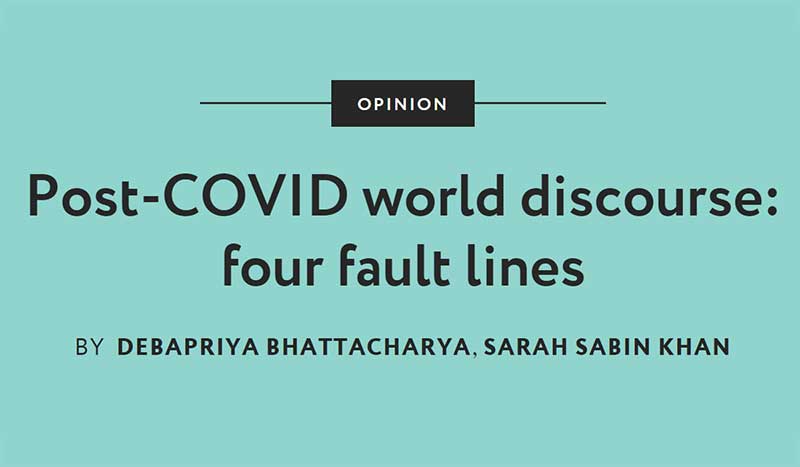Originally posted in On Think Tanks on 11 January, 2021

There is a plethora of published views, opinions and emerging evidence available on what the post-COVID world might look like. A broad consensus seems to exist regarding how things won’t – or can’t – go back to the way they were before. A ‘new normal’ will emerge resulting in a significant refashioning of the status quo, for economic agents as well as governance structures globally.
When it comes to the specifics and trends for a post-pandemic future, however, predictions become quite divergent. Some onlookers emphasise that pre-COVID trends will be accentuated. Others envisage new trends that demand novel approaches to deal with them.
Projections for medium-term outcomes are even more divided. Pessimistic views dominate some discussions, while others are more inclined towards optimistic outlooks. There are also conversations that explore the multiple variants of these two trends in perspectives.
Of course the discourse is still young, so it is understandable that it is led more by perceptions, interpretations (and sometimes wishful thinking) than by robust evidence.
But a review of the opinions and outlooks out there so far suggests that there are a number of vital gaps that need to be brought forth if we are to ‘build back better’ and in an inclusive and sustainable way. These include:
1. Southern voices and local contexts are missing
Despite the recognition that the South will have a potent and active role to play in ‘building back better’, the voice of the global South in the knowledge system continues to be missing. The conventional top-down interpretation of issues relevant to developing countries fails to capture the nuances presented by local and contextual factors.
2. Limited focus on long-term implications
Discussions have largely been around the immediate aftermath, or mid-term outlook at best. Without a prognosis beyond the initial three to five years post-COVID, it would be difficult to push for the much required structural and systemic changes that are necessary for sustainable and positive outcomes.
In the absence of a long-term outlook, the current discourse can’t show a clear pathway towards the aspired future. The lines of causation that would take the world one way or the other are still ambiguous. What will be the roles of the traditional and emerging actors? There is a need for much more study and analysis in this regard.
3. Over-generalised perceptions about anticipated changes
This seems to be due to inadequate appreciation for the potential synergies and trade-offs among policy choices for achieving a fairer and more participatory economy and society. Furthermore, given these interlinkages, such choices need to be considered within concrete circumstances. This aspect, as it is, would affect the prioritisation and sequencing of interventions needed to maximise the momentum of potential change.
4. Absent national level analysis of global trends
With the exception of some discussion on climate change, implications of the various other global systemic concerns (e.g. flow of development finance, rule-based market access of products and services or access to technology) on national development prospects are almost absent in the discourse.
Global systemic concerns can be both aggravating or enabling within specific areas and national contexts. It is crucial to acknowledge and understand the nature of effects global issues have on national prospects and the channels of their transmission. Views on whether national processes, particularly in the global South, will have bearings in refashioning the global architecture also need closer observation.
Addressing these discernible gaps
This will require more factual, contextual and structured arguments that can be developed over time. Participatory and rigorous foresight research – beyond public health management, looking at economic, social, environmental and governance-related areas – will be particularly critical.
If we take a ‘theory of change’ approach, the purpose of such exploration should be to generate the necessary evidence and consolidate experience and knowledge to identify the contours of a better future (changes as outcomes), to spell out pathways (changes required) and to delineate the specific role of different actors (actions by change agents).
Taking a bottom-up approach that embeds the relevant experience and aspirations of citizens in this global project is the first step towards addressing these knowledge and evidence gaps.
Southern countries will have a big role to play. Not only do they have the largest stakes in a more prosperous, fairer and shared world order, but the experience of the pandemic has also imbued them with new zeal and drive to contribute towards the design and delivery of the envisaged global project. The urgency induced by COVID-19 is a clear opportunity for stakeholders in the global South to amplify their voice and role by spearheading global solutions through innovative research and outreach initiatives grounded in Southern experience.
Southern think tanks are particularly well placed to intervene and play an influential role in shaping this course. These centres of excellence in the South and their professional networks host some of the most experienced minds and expertise on diverse development issues. The time is opportune for Southern knowledge hubs to rise to the occasion by strengthening their creative and collaborative efforts and contributing to the impactful policy debates and designs for a sustainable post-COVID world.


